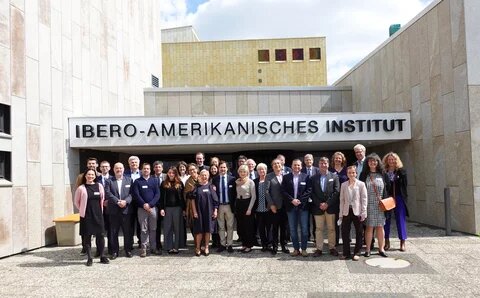
On April 28 and 29, 19 representatives of European-based research centres and study associations dedicated to the analysis of Latin America and the Caribbean (LAC) and the bi-regional EU-LAC relations came together in the Simon Bolívar Hall of the Ibero-American Institute (IAI) for an open, in-person exchange on the challenges of the COVID-19 pandemic, Russia’s invasion in Ukraine and their social, economic and (geo)political effects. This two-day encounter was co-organised by the EU-LAC Foundation, the IAI and the GIGA-Institute for Latin American Studies (GIGA-ILAS) and aimed at joint reflections on political and cultural policies – bilaterally, regionally and bi-regionally – and the intensification of networks between the invited institutions.
The discussion on the first day among participants evolved around three thematic areas: Recent global challenges and their impact on the research agendas of centres and associations; recent global scenarios and their implications for the transfer of information and knowledge from centres and associations, and lastly, the challenges and opportunities that have emerged for EU-CELAC bi-regional cooperation in the new global scenarios.
During the first session, the participants informed how the operations of universities and their research agendas, including theoretical and conceptual reflections, research questions and methodologies, have been strongly impacted by the pandemic. Moreover, Russia's invasion of Ukraine has caused new academic debates on how individual countries and the LAC region have positioned themselves within shifting geopolitical configurations at the global level. Subsequently, the dialogue focused on challenges for successfully applying for research funding; the cultural and digital exclusions involved by conventional forms of publishing and knowledge transfer; and the importance of differentiating between the research agendas of Think Tanks and academic departments/centres. Moreover, the participants exchanged their views on the impact of the war in Ukraine in LAC, the most sensitive and urgent issues involved, and concrete recommendations to the European Union. In this sense, the participants discussed the challenges and opportunities that emerged for EU-CELAC bi-regional cooperation amidst the new global scenarios marked by post-pandemic recovery and Russia’s war in Ukraine.
The second day of the activity started with a session on the extent to which research centres had an impact on decision-making processes at national and European levels. This question led the participants to reflect on ways to bring the LAC region more to the fore of external policy agendas of European states and the EU. They discussed the challenges involved in influencing parliamentarians and ministers, the lack of advocacy in favour of strengthened EU-LAC relations at the European level, the importance of different forms of advocacy which included conferences and the drafting of policy papers, and the need to cooperate with society, the private sector, and NGOs.
In the following thematic block, the attendees exchanged their views on shared interests, complementarities and possible joint efforts to create greater synergies and strengthen the work of the present research centres and think tanks. Among others, concrete ideas for cooperation at the European level among research centres, universities and think tanks were presented, such as the organisation of conferences, dissemination of texts and the launching of joint calls. The importance of direct consultations with decision-makers and the relevant role of the EU-LAC Foundation to visualize and channel such initiatives were explicitly articulated.
The following representatives were part of this meeting: Anna Ayuso, Senior Reserch Fellow of Barcelona Centre for International Affairs (CIDOB); Barbara Hogenboom, Director of Centre for Latin American Research and Documentation (CEDLA), University of Amsterdam; Maria Clara Lilia Medina, President European Council for Social Research on Latin America (CEISAL) and Lecturer at School of Global Studies, University of Gothenburg; András Lénárt, Senior Lecturer at the Department of Hispanic Studies, University of Szeged; Carlos Malamud, Lead Researcher of Elcano Royal Institute; José Antonio Sanahuja, Director of Fundación Carolina; Francisco Verdes-Montenegro Escánez, Researcher of Fundación Carolina; Claudia Zilla, Senior Fellow at the German Institute for International and Security Affairs (SWP); Merike Blofield, Director of GIGA Institute for Latin American Studies (GIGA-ILAS); Bert Hoffmann, Lead Research Fellow of GIGA-ILAS; Barbara Göbel, Director of Ibero American-Institute (IAI), Berlin; Peter Birle, Director - Research Division of Ibero American-Institute (IAI), Berlin and Representative of Asociación Alemana de Investigaciones sobre América Latina (ADLAF); Carlos Quenan, Vice-President of the Institut des Amériques (IdA); Florence Pinot, Director of Centre d'Etudes et Recherche América Latine Europe (CERALE); Capucine Boidin, Director of Institut des Hautes Etudes de L'Amérique Latine (IHEAL); Sérgio Costa, Professor in Sociology at the Institute for Latin American Studies (LAI), Freie Universität Berlin; Francisco Sánchez, Director of the Instituto de Iberoamérica, Universidad de Salamanca; Paulo Neves, President of the Instituto Para a Promoção da América Latina e Caraíbas (IPDAL), Jussi Pakkasvirta, Vice Dean, Head of Department of Cultures of Latin American Studies, Department of Cultures, University of Helsinki; Thais Machado Borges, Director of Nordic Institute of Latin American Studies (Nilas), Stockholm University; Bartłomiej Znojek, Analyst, Polish Institute of International Affairs (PISM), and Gaspard Estrada, Executive Director of Political Observatory of Latin America and the Caribbean (OPALC), CERI, Sciences Po.
The event was also attended by the Ambassador of the Argentine Republic in Germany, Pedro Villagra Delgado and Yvan Vassart, Policy Officer of the European External Action Service (EEAS). Moreover, as part of the meeting, Jerónimo Giorgi and Mélany Barragán presented the Editorial Latinoamerica21’s “Atlas 21, the post-COVID world, a paradigm shift?“, and Gaspard Estrada offered an insight into SciencesPo/OPALC’s „Yearbook Latin America, the political year 2021“.